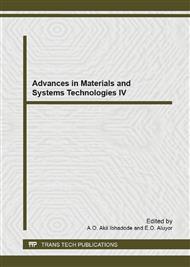p.584
p.597
p.605
p.613
p.630
p.635
p.643
p.650
p.656
Preliminary Design for Solid Waste Incineration for Power Generation in Benin Metropolis, Nigeria
Abstract:
Solid waste management is commonly seen in Nigeria as simply pick up the waste and go dump it in a hole somewhere. Hence the current major solid waste management method in Nigeria is disposal at dumpsite. The solid waste management practice at the dumpsite is simple. The waste disposal trucks drive into the dumpsites through the access roads and dump their waste. Other vehicles that deliver waste to the site simply dump their waste indiscriminately by the road sides. The workers at the dumpsites use shovel to manually push the waste from the road and try to spread them as much as their strength can go. Thereafter, open air incineration without pollution control is carried out on the waste for volume reduction. This is not sustainable as it does not bring financial return at the end point of the waste. Therefore incineration with pollution control and energy recovery that will bring financial returns at the end point of the waste is ineviTable for sustainable solid waste management. In the work reported in this paper a study and preliminary design for incineration with energy recovery has been carried out. A review of solid waste component in Benin metropolis was carried out to determine the proportion of combustible material in the waste streams in the metropolis. Several conceptual designs were developed and one was selected. Detail design of a prototype for 15kW electrical power generation was done. The result obtained showed that about 43% of combustible commercial solid waste and about 16% of combustible domestic solid waste are generated in Benin metropolis. The result also showed that about 72Kg/s of combustible municipal solid waste is required for the generation of about 15kW of electrical power and the exhaust gas can be used for other process systems such as systems for drying agro-produce.
Info:
Periodical:
Pages:
630-634
DOI:
Citation:
Online since:
September 2013
Authors:
Price:
Сopyright:
© 2013 Trans Tech Publications Ltd. All Rights Reserved
Share:
Citation:


